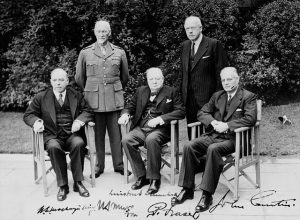What’s up, Doctrine?

Recently, I became a last-minute replacement for a panel discussion at a Montreal university for the “Anti-Capitalist Teach-in Against the G8/G20”. The person I replaced said he had to back out that day because of work. Later, he said he’d received a call from the Canadian Security and Intelligence Service, or CSIS. Lately, a lot of activists say they’ve had CSIS knocking on their doors.
The Quebec Public Interest Research Group organized the event. QPIRG is a resource centre for student research, and a vehicle for student social and political activism. I looked at QPIRG’s Facebook page on the event to learn more about my panel: “Indigenous Sovereignty, Displacement and Migration”. Then I went to look for about the G8/G20.
The G8 is an exclusive club, I find. It’s a routine gathering of the richest and most powerful nations in the industrial world. It began with France in the mid-1970s pulling in other European nations along with Japan and the United States. They waited a couple of years before asking Canada to join.
The G8’s membership has expanded and is now the “G8-plus-5”. Together, this club controls a lot of global trade and commerce and much of the developed world’s financial systems. They also spend more on their military budgets than most non-member nations.
The G20 began as a club for “emerging” or developing nations, mostly in the southern hemisphere and for similar reasons as the G8. All of the 19 nation members have growing financial power and political influence in world affairs. For instance, India, China, Brazil, South Africa, and South Korea are members of the G20. There are only 19 nations in the G20 with the European Union sitting in the 20th seat.
The G8 has a close – even cozy – relationship with the G20. It could almost be called a mentorship, of sorts. It’s a relationship built on development, aid and trade. The G20 represents resources and huge present and potential markets for the industrialized nations. On the other hand, the G8 represents money to the emerging nations via investments, financial institutions, and projects run by multi-national corporations.
Both the G8 and G20 work behind closed doors, come to “informal” agreements on monetary policies, banking, trade, humanitarian aid, climate change, global security, and more. This time, Canada – the host – also wants “women’s reproductive health” on the agenda, raising alarms that the Canadian Government is trying to impose the Conservative Party’s Christian values into the mix and re-open the abortion debate at home, but at the expense of women’s health abroad.
At the Teach-in, I detect strong distrust among the participants of the cozy relationship, the secrecy of the backroom wheeling and dealing and arm-twisting, the lack of accountability along with the stale odour of an “old boys club” – and all that phrase implies – which grates among these social, political and human rights activists. They dislike the actions of some nations that strike deals at these annual G8/G20 gaggle-wanks that they say create conditions to benefit the First World while continuing or worsening the dependency and exploitation of the Third World.
Another concern arises when these former colonial masters get chummy with their former colonies, exchanging and sharing policies and processes and passing along habits — both good and bad. They have a point. A recent United Nations study concludes that one of those bad habits has historically allowed the “Christian” world to “dehumanize” non-Christians and non-Europeans around the globe in the name of European expansion. These policies, the study found, allowed the dispossession of Indigenous peoples of their lands around the world, their subjugation, and provided the legal and political justification for a global slave trade.
Special Rapporteur Tonya Gonnella Frichner, Permanent Forum member from the United States, presented to the 16-member body her preliminary study of the impact on indigenous peoples of the international legal construct known as the “Doctrine of Discovery”. The just-completed survey revealed that the Doctrine, along with papal bulls dating back to the fifteenth century, and other such Vatican documents and royal charters, had evolved – with disastrous effect on the world’s indigenous nations and peoples – into an interpretative framework that had become institutionalized in law and policy, at national and international levels.
“That interpretive framework is the root problem facing indigenous peoples,” she continued, emphasizing its two elements: dehumanization and dominance. For centuries, the terrible scenario played out thusly: A Christian monarch who located or “discovered” non-Christian lands and territories had the right to claim a superior and paramount title to those territories. Further, the Doctrine held that non-Christian lands were considered to belong to no one, and once a Christian monarch had claimed the right of dominion, that claim was transferred to other political successors.
This sparked memories of my parents and their political discussions around the kitchen table. They would dissect Canadian Indian policies and laws with precision and clarity. They raised questions about the moral and legal justifications of the Indian Act. They fumed at Canada’s continuous attempts to assimilate Indigenous peoples; by suppressing efforts at Indigenous self-determination, by working in open or by sly to destroy Indigenous languages and cultures, to separate Indigenous peoples from their traditional territories.
Mostly, however, my parents fumed at Canada and its governments because they felt its officials refused to deal with them and other Indigenous peoples honestly or with honour.
Click here for Part 2.

